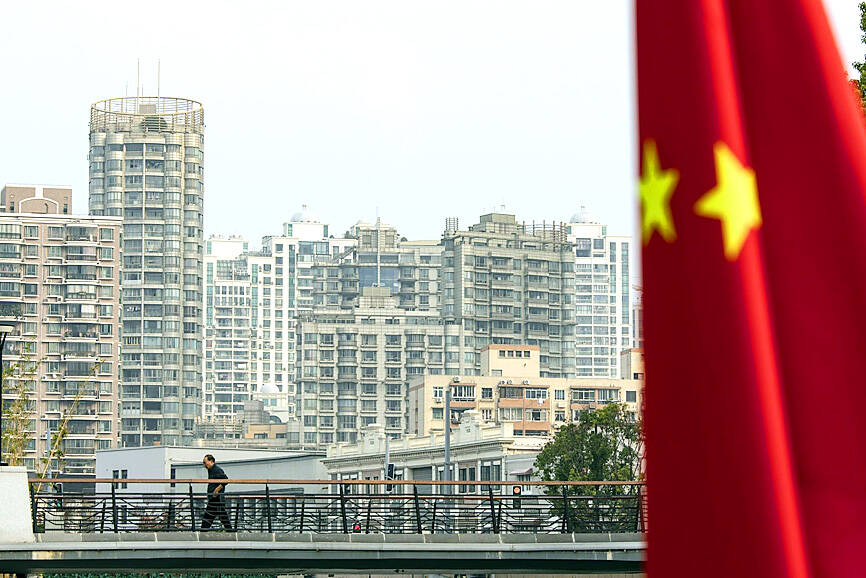Chinese authorities have unveiled sweeping measures to rescue its struggling property sector, as regulators seek to offset years of harsh COVID-19 pandemic curbs and a real-estate crackdown that have stalled the world’s No. 2 economy.
China’s banking regulator and central bank on Friday issued a 16-point set of internal directives to promote the “stable and healthy development” of the industry, which were reported by Chinese state media yesterday.
The measures include credit support for debt-laden housing developers, financial support to ensure completion and handover of projects to homeowners, and assistance for deferred-payment loans for homebuyers.

Photo: Bloomberg
That came on the same day the Chinese National Health Commission issued 20 rules for “optimizing” Beijing’s “zero COVID” policy, where certain restrictions were relaxed to limit its social and economic impact.
“We view this as the most crucial pivot since Beijing significantly tightened financing of the property sector,” Nomura Holdings Inc chief China economist Ting Lu (陸挺) wrote in a note. “We believe these measures demonstrate that Beijing is willing to reverse most of its financial tightening measures.”
Hong Kong stocks surged more than 3 percent yesterday, extending Friday’s rally of more than 7 percent the measures were unveiled.
Beijing imposed widespread lending curbs on property developers in 2020, which exacerbated their liquidity issues and caused several of the largest to default on bond payments.
The knock-on effects on the massive real estate sector were severe, with cash-strapped developer Evergrande Group (恆大集團) — China’s largest — and others failing to complete projects, sparking mortgage boycotts and protests from homebuyers.
The measures emphasized “guaranteeing the handover of buildings,” and ordered development banks to provide “special loans” for the purpose, according to a document circulating online.
It orders financial institutions to treat state-owned and private real-estate enterprises equally, as well as “actively cooperating with distressed real estate enterprises in risk management.”
The measures also include “extending the transition period arrangements... of real-estate loans” for distressed developers, and support for “high-quality real-estate enterprises to issue bond financing.”
“The plan includes financial stability measures that aim to prevent massive defaults and hence provide a ‘soft landing,’” Australia and New Zealand Banking Group Ltd analysts wrote in a note.
However, they also said these changes — alongside limited loosening of “zero COVID” measures — would not cause an immediate recovery for the ailing sector.
“While not many are expecting a financial crisis caused by the current property downturn, the mainstream view is that the property sector would stay weaker for longer. Therefore, the worst is far from over for developers,” Macquarie Securities Inc economist Larry Hu (胡偉俊) wrote in a note.
Prices of new homes have been falling for more than a year, while demand is struggling to pick up owing to ongoing strict pandemic controls that have dampened consumer confidence.

Intel Corp chief executive officer Lip-Bu Tan (陳立武) is expected to meet with Taiwanese suppliers next month in conjunction with the opening of the Computex Taipei trade show, supply chain sources said on Monday. The visit, the first for Tan to Taiwan since assuming his new post last month, would be aimed at enhancing Intel’s ties with suppliers in Taiwan as he attempts to help turn around the struggling US chipmaker, the sources said. Tan is to hold a banquet to celebrate Intel’s 40-year presence in Taiwan before Computex opens on May 20 and invite dozens of Taiwanese suppliers to exchange views

Application-specific integrated circuit designer Faraday Technology Corp (智原) yesterday said that although revenue this quarter would decline 30 percent from last quarter, it retained its full-year forecast of revenue growth of 100 percent. The company attributed the quarterly drop to a slowdown in customers’ production of chips using Faraday’s advanced packaging technology. The company is still confident about its revenue growth this year, given its strong “design-win” — or the projects it won to help customers design their chips, Faraday president Steve Wang (王國雍) told an online earnings conference. “The design-win this year is better than we expected. We believe we will win

Chizuko Kimura has become the first female sushi chef in the world to win a Michelin star, fulfilling a promise she made to her dying husband to continue his legacy. The 54-year-old Japanese chef regained the Michelin star her late husband, Shunei Kimura, won three years ago for their Sushi Shunei restaurant in Paris. For Shunei Kimura, the star was a dream come true. However, the joy was short-lived. He died from cancer just three months later in June 2022. He was 65. The following year, the restaurant in the heart of Montmartre lost its star rating. Chizuko Kimura insisted that the new star is still down

While China’s leaders use their economic and political might to fight US President Donald Trump’s trade war “to the end,” its army of social media soldiers are embarking on a more humorous campaign online. Trump’s tariff blitz has seen Washington and Beijing impose eye-watering duties on imports from the other, fanning a standoff between the economic superpowers that has sparked global recession fears and sent markets into a tailspin. Trump says his policy is a response to years of being “ripped off” by other countries and aims to bring manufacturing to the US, forcing companies to employ US workers. However, China’s online warriors